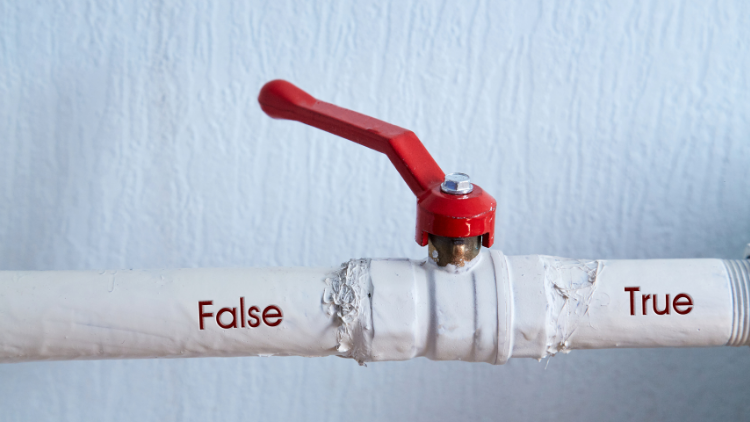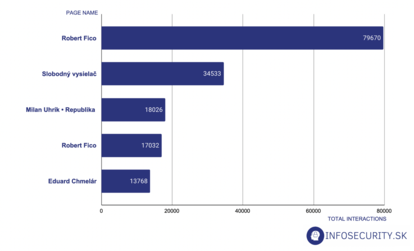DISINFORMATION
Attacks on President Zelensky are dominating the disinformation narratives in Slovakia

The war in Ukraine is still the main topic of disinformation spreading in Slovakia. In recent weeks, we have seen an increase in attacks on Ukrainian President Zelenskyi. Pro-Kremlin disinformers are trying to discredit him, for example, through alleged drug addiction. Meanwhile, Slovak opposition parties are blaming President Zelenskyi for the gas crisis caused by the Russian occupiers.
Infosecurity.sk presents an overview of disinformation trends that have been on the rise in information space in the past two weeks:
- The war in Ukraine still presents an overwhelming majority of misinformation in Slovakia.
- Disinformation narratives are now focusing on Ukrainian President Zelenskyi. They are trying to discredit him through personal attacks, such as false claims about his drug addiction. Most of these claims are fabricated lies lacking any evidence.
- An important topic in recent weeks is Russian oil and gas. The oil embargo proposed by the European Commission was picked by opposition parties who abuse this issue for their political gain. They mislead people by proclaiming that the Slovak government is acting against Slovak national interests by obeying the dictate of the United States or Brussels.
- Disinformation actors linked Zelenskyi's speech in the Slovak parliament with the current slowdown in gas supplies. According to them, the president himself is halting gas flow to Slovakia even though the slowdown is caused by Russian military activities in the eastern part of Ukraine.
Personal attacks toward president Zelenskyi
Various fake news about President Zelenskyi has begun to spread in recent weeks. Thousands of people in Slovakia are sharing fabricated lies about him.
One of the most common attacks is claiming that Zelenskyi is a drug addict. To support their argument, propagandists provide out-of-context videos or photoshopped pictures. For example, Zelenskyi regularly shoots videos informing on his work, most recently sharing a video that he works late into the night.
There is nothing in the video to prove that he was under the influence of any substance. Nevertheless, pro-Kremlin propagandists use this video as evidence. In addition, they claim that the video was removed quickly, although it is still available on his social media. A similar "proof" is a short excerpt from a press conference where the president is visibly exhausted. The last example is a video from a phone call with Elon Musk, in which Zelenskyi allegedly has drugs on his desk. Slovak Police Force warns users on social networks that the video is a hoax.
Another common way that propagandists use to discredit his character is by pointing out Zelenskyi’s former career as an actor and comedian. In his most recent video, an opposition extremist member of parliament, Milan Mazurek, used short clips from comedy sketches that Zelenskyi filmed before becoming president. Mazurek calls him “degenerate” and “pervert” while showing Zelenskyi’s parody of a famous music video by Beyoncé.
Ad hominem attack is a type of fallacious argument. Instead of providing reasonable arguments about the issue discussed, those who use it attack their opponent personally. It is a typical tool of propaganda that is used to divert attention away from the argument itself.
In Slovakia, there has been an enormous increase in personal attacks on president Zelenskyi. Its sole aim is to discredit him and thus help Kremlin propaganda.
Debates on Russian gas and oil
The latest topic that took over the Slovak disinformation scene is Russian oil and gas import. The debate is dominated by the opposition party SMER-SD and its leader Robert Fico who organizes press conferences and shoots videos about the issue.
The European Commission unveiled proposals for the 6th package of Russian sanctions focusing on a permanent embargo on Russian oil. While European leaders are still discussing the issue, a disinformation narrative is already spreading, especially by the part of Slovak opposition parties.
In his recent press conference, Robert Fico argued that the oil embargo is nonsense demanded by the United States. According to him, European leaders are committing suicide by obeying the national interests of the United States. Fico is asking why Slovakia does not stand up with Hungary and the Czech Republic and oppose the proposal, even though Slovakia and two others are supposed to get a temporary exception from the embargo.
After Zelenskyi's online speech in the Slovak parliament this week, opposition parties and other disinformation actors turned the debate back to Zelenskyi. According to their latest claims, Zelenskyi himself is halting the flow of Russian gas and oil to Slovakia.
Once again, we see ad hominem attacks on Zelenskyi. Robert Fico explained that he would not listen to "Mr. Comedian who lies on a daily basis" and threatened Slovakia by stopping gas deliveries to Slovakia. Fico is discrediting Zelenskyi by pointing to his former career as an actor.
Pro-Kremlin disinformers are stating Zelensky himself has already stopped the gas supply to Slovakia. In reality, Ukraine indeed had halted Russian gas flow to Europe through the Sokhranovka transit point. GTSOU, which operates Ukraine's gas system, announced it is no longer able to operate transition points due to the activities of Russian occupants in Donbas.
Richard Sulík, Slovak Minister for Economy, announced that despite halting the transition point, the situation in Slovakia is stable, and the gas is still inflowing in sufficient numbers. The same situation applies to oil.
Well-known actors are leading the discussion
The chart below shows the most popular Facebook posts on the Slovak disinformation scene in the last two weeks. Posts were evaluated based on the total number of interactions (the sum of all reactions, comments, and shares).
In the analysis, the posts were filtered only for those containing the keyword plyn (ENG: gas) among the actors in our list . Recently, this is an important topic in Slovakia.

The results show us that former Prime Minister Robert Fico is dominating the debate. In all his posts, he misleads about this topic. Slobodný vysielač, a Slovak disinformation radio station, shared a video of Lavrov’s speech on gas imports to Europe. The third most popular post belongs to far-right Slovak MEP Milan Uhrík, who accuses Brussels of a dictate while not forgetting to mention the topic of political correctness, migrants, or LGBT. Lastly, the post of Eduard Chmelár, Slovak historian and politician, gained attention for blaming Zelenskyi, the Slovak government, and NATO for the energy crisis.
Project Infosecurity.sk organised by STRATPOL – Strategic Policy Institute and Slovak Security Policy Institute, which is supported by the Prague office of the Friedrich Naumann Foundation for Freedom, continuously monitors the activities of both Slovak and foreign disinformation actors, but focuses mainly on the former. The project activities are built upon daily monitoring of emerging disinformation, hoaxes, and conspiracy theories in the online information space. This approach allows the analysts to identify disinformation posts and narratives that resonated with the public the most, as well as to find out where they originated, and how they spread and evolved on social media. The report takes the form of a bi-weekly summary of arising trends in the spread of malicious information content online. Based on that, Infosecurity.sk can warn the public about emerging and current trends in the field of disinformation, manipulation, and propaganda.